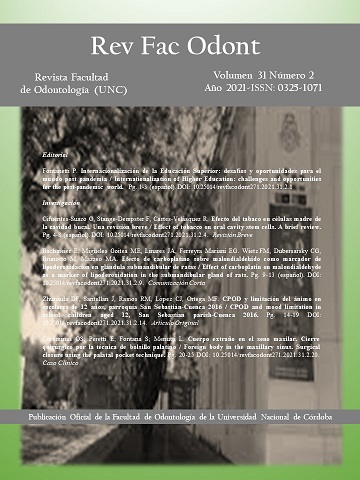Internationalization of Higher Education: challenges and opportunities for the post-pandemic world
Keywords:
High EducationAbstract
University students need experiences in their training that favor the development of international and intercultural competences and that provide them with tools to interact assertively with the world. To maximize the exchange of educational experiences and enhance internationalization processes, it is necessary to include actions that ensure equitable access to technological resources and that facilitate international networking opportunities.
Downloads
References
UNESCO Institute for Statistics. UIS Database, 2019 [Documento en línea]. Disponible: http://data. uis.unesco.org/ [Consulta: 2021, julio, 29].
Gacel-Ávila, J., & Rodríguez-Rodríguez, S. Internacionalización de la educación superior en América Latina y el Caribe. Un balance. México: UNESCO-IESALC, Universidad de Guadalajara y Benemérita Universidad Autónoma de Puebla, 2018.
Knight, J. Updated Definition of Internationalization. International Higher Education, 2003; 33. https://doi.org/10.6017/ihe.2003.33.7391
Beelen, J., & Jones, E. Redefining Internationalization at Home. In A. Curaj, L. Matei, R. Pricopie, J. Salmi, & P. Scott (Eds.), The European higher education area: between critical reflections and future policies. Springer, 2015:59-72. Netherlands. https://doi.org/10.1007/978-3-319-20877-0_5
Ryabova, A. Collaborative online international learning projects in the context of contemporary pedagogical challenges. Pedagogical Journal 2020;10(3A): 238-246.
Published
Issue
Section
License

This work is licensed under a Creative Commons Attribution-NonCommercial-ShareAlike 4.0 International License.
Aquellos autores/as que tengan publicaciones con esta revista, aceptan los términos siguientes:
- Los autores/as conservarán sus derechos de autor y garantizarán a la revista el derecho de primera publicación de su obra, el cuál estará simultáneamente sujeto a la Licencia de reconocimiento de Creative Commons que permite a terceros:
- Compartir — copiar y redistribuir el material en cualquier medio o formato
- La licenciante no puede revocar estas libertades en tanto usted siga los términos de la licencia
- Los autores/as podrán adoptar otros acuerdos de licencia no exclusiva de distribución de la versión de la obra publicada (p. ej.: depositarla en un archivo telemático institucional o publicarla en un volumen monográfico) siempre que se indique la publicación inicial en esta revista.
- Se permite y recomienda a los autores/as difundir su obra a través de Internet (p. ej.: en archivos telemáticos institucionales o en su página web) después del su publicación en la revista, lo cual puede producir intercambios interesantes y aumentar las citas de la obra publicada. (Véase El efecto del acceso abierto).

